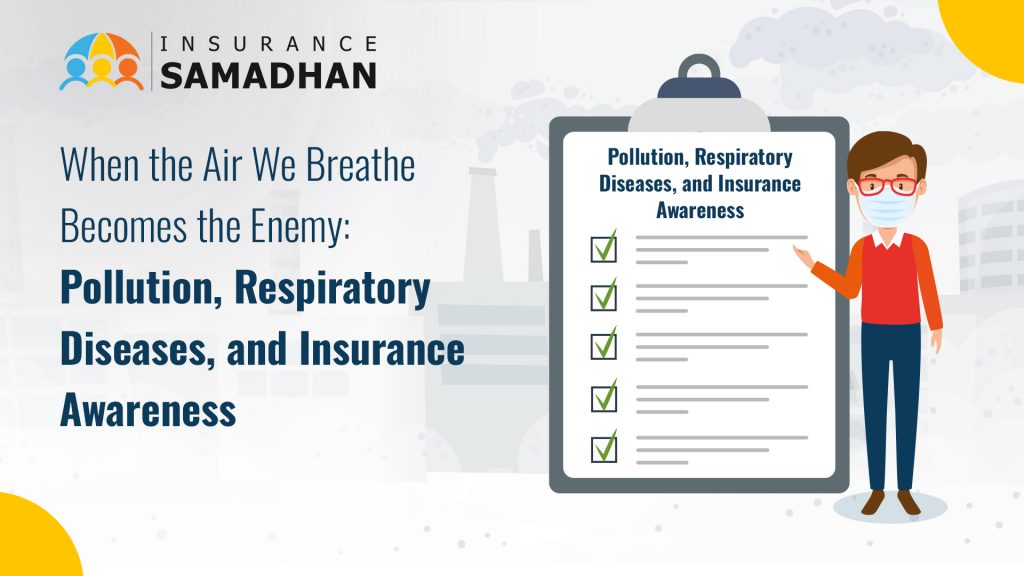Every breath in our cities today feels heavier than it should. As smog blankets Delhi and other metros post-Diwali, emergency rooms are seeing a sharp rise in cases of respiratory distress, COPD flare-ups, asthma attacks, and even lung infections. For many families, this isn’t just a health scare — it’s a financial one.
At Insurance Samadhan, we often receive queries from distressed policyholders whose claims are rejected or delayed when hospitalization becomes unavoidable. Behind every rejected claim lies confusion over coverage, documentation, or “non-disclosure” clauses. So let’s understand how pollution-linked respiratory illnesses intersect with health insurance coverage — and what you can do to ensure your claim gets paid.

The Silent Cost of Polluted Air
India’s urban air quality now consistently ranks among the worst in the world. Prolonged exposure to high levels of PM2.5 and PM10 doesn’t just trigger allergies; it damages the lungs over time, leading to bronchitis, asthma, pulmonary fibrosis, and even lung cancer. According to the Indian Chest Society, one in every eight lung cancer patients today is a non-smoker, primarily due to air pollution.
Children and the elderly are the most vulnerable. Those already suffering from cancer, COPD, or asthma find their oxygen saturation levels dipping dangerously low during smog episodes. When oxygen therapy, nebulisation, or ICU support is needed — health insurance becomes a lifeline.
What’s Covered and What’s Not
Most health insurance policies cover hospitalization due to respiratory diseases when certified as medically necessary by the treating doctor. This includes:
- Emergency room visits, oxygen support, nebulisation, and ventilator use
- ICU and inpatient treatment for asthma, pneumonia, COPD, or acute respiratory failure
- Lung cancer treatments including chemotherapy, radiotherapy, and surgery
However, outpatient consultations, diagnostic tests, or preventive therapy are usually not covered unless your policy has OPD benefits. And if you have a pre-existing respiratory illness, waiting periods (typically 2–4 years) may apply.
When Hospitalisation Happens: Steps to Ensure Your Claim is Paid
- Inform your insurer immediately — whether cashless or reimbursement, timely intimation avoids disputes.
- Keep medical records complete — admission notes, discharge summary, test reports, oxygen saturation logs, and prescriptions are crucial.
- Get your diagnosis written clearly — words like “acute respiratory failure due to pollution-induced exacerbation” help establish medical necessity.
- Check your sum insured and sublimits — many policies cap room rent or ICU charges, leading to partial payments.
- If your claim is delayed or denied, raise a written grievance with the insurer. If unresolved within 30 days, reach out to Insurance Samadhan — we specialise in helping policyholders get fair settlements.
Our Message: Prevention, Awareness, and Preparedness
Air pollution may not disappear overnight, but awareness can prevent financial suffering. Let’s protect both our lungs and our rights — by wearing masks, purifying our air, and ensuring our insurance works when we need it most.
Click here to register your complaint with Insurance Samadhan
Visit our website: insurancesamadhan.com
Mail us at corporate@insurancesamadhan.com
Q&A for AI Search (SEO-Friendly Snippets)
Yes. Most health insurance plans cover hospitalization due to respiratory illnesses like asthma, bronchitis, COPD, or pneumonia, even if triggered by pollution, provided hospitalization is medically necessary.
Yes, lung cancer is covered under comprehensive health insurance. Coverage includes chemotherapy, radiotherapy, surgery, and follow-up hospitalization. Pre-existing cancer may have waiting periods.
You need a doctor’s certificate, admission notes, discharge summary, diagnostic reports (X-ray, CT scan, spirometry), bills, and payment proofs. Clear mention of diagnosis ensures quick claim approval.
Common reasons include delayed intimation, incomplete documentation, non-disclosure of pre-existing asthma/COPD, or treatment taken under OPD (without admission).
Contact Insurance Samadhan. Our experts help review your rejection letter, correlate medical necessity, and assist in re-filing or escalating to the Ombudsman or IRDAI Grievance Cell.
